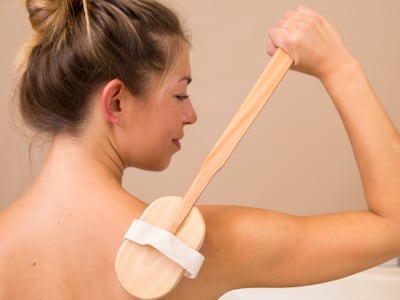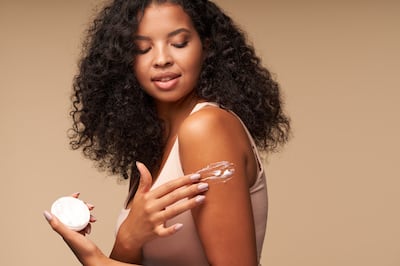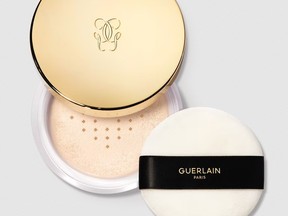
The benefits of exfoliating, and the key post-scrub steps for toned, glowing skin
Skincare may experience a multimillion-dirham boom year after year, but the notion of taking care of your epidermis is nothing new, especially when it comes to exfoliating.
A practice favoured by the ancient Egyptians, the public bathing that would develop into the classic Middle Eastern hammam ritual features full body exfoliation with a kessa glove to remove dead skin cells and leave skin feeling silky and smooth.
There are a variety of exfoliants on the market. Experts say that while the practice is beneficial, it’s a beauty step that needs to take into consideration skin type, age and skin condition, as well as different-strength products for the face and body.
What are the benefits?
Orsolya Matheisz, co-founder of Orskin Aesthetics Clinic, says whether using a body scrubber, loofah or cosmetic exfoliant, the exfoliating process is beneficial both by itself or as a step in a process that includes moisturising and replenishing skin with oils and serums.
“With exfoliating, we can remove dead skin cells from the face and body,” she says. “Exfoliants allow your skin to absorb moisturiser better. They unclog pores, prevent ingrown hairs, increase circulation and increase cell turnover rate. Sometimes when the skin is dry, we may think it is because of lack of hydration; however, it can also be because the skin has not been exfoliated.”
Matheisz says exfoliating the body, using a mix of specific and circular motions stimulates blood flow to encourage lymph drainage, whereby waste in the bloodstream is carried away from tissue and back towards the heart.
The process, she explains, has also been shown to improve the appearance of cellulite and aid skin elasticity.
Helping the skin absorb moisture
Geraldine Janse Van Veuren, brand manager of skincare company Comfort Zone, says sloughing away dead cells helps the skin to better absorb skincare products by removing the barrier, and allowing creams and serums to penetrate more deeply.
Facial skin is made up of smaller-sized cells than skin on the body. Janse Van Veuren says that makes product penetration more difficult due to the compacted space, while the thinner skin makes the face more prone to ageing.
“Regular exfoliation helps to unclog pores, reducing the likelihood of blackheads and acne,” says Janse Van Veuren. “Over time, it can even out your skin tone, diminishing the appearance of dark spots and hyperpigmentation. Additionally, exfoliation stimulates collagen production, which is essential for maintaining firm, youthful skin.”
Should you use a different exfoliant for face and body?
Skincare expert and senior medical aesthetician Dalya Sager says skin cells on the face are renewed about two to three weeks faster than the skin cells on the body, so they are more sensitive. “It’s advisable to use exfoliants that are specifically designed for the face which are non-irritant and gentle.”
She says the difference in skin thickness allows for the use of higher percentage acid peels or a stronger polish on the body as an exfoliant. There are also a variety of ways in which to apply exfoliants.
Matheisz says mechanical options include loofahs, brushes, sponges and gloves, while chemical varieties such as Alpha-hydroxy acids (AHAs) – glycolic, lactic and citric acids – and Beta-hydroxy acids (BHAs), such as salicylic acid, work better for different skin types or acne-prone skin.
“If the skin is dry, it would be better to use lactic acid. If there is the presence of melasma, avoid harsh scrubs and peels altogether as this can worsen pigmentation and exacerbate the condition,” Matheisz.
Can you over-exfoliate?
Over-scrubbing or using too-harsh chemicals can cause redness and irritation, acne to worsen and a weakening of the skin cell structure, says Sager.
“Over-exfoliation thins the skin and causes premature ageing due to loss of elasticity,” she explains. “Skin needs enough time for cell renewal to effectively produce collagen, elastin and melanin. If skin is exfoliated before efficient cell renewal, the cell structure weakens resulting in its breakdown. Therefore, conditions such as acne, rosacea, pigmentation and ageing will occur over time.”
For spot or acne-prone skin, too much exfoliating strips the lipid barrier in the epidermis, making skin susceptible to irritation, infection and flare-ups.
“You should also avoid exfoliating before and after certain treatments such as micro needling or chemical peels and laser treatments,” says Matheisz. “Also avoid exfoliating your skin when you experience cold sores or have any wounds.”
Ingredients to avoid
Unless doctor or dermatologist-prescribed, experts advise avoiding strong chemicals or highly concentrated ingredients in face and body exfoliants. Other ingredients to avoid include alcohol, strong fragrances, synthetics and dyes.
“Scrubs should have smooth spherical beads and not rough edges as the roughness of some scrubs will damage to the skin barrier function, which is designed to protect the skin,” says Sager. “Tears or scratches will expose the skin to infection and prolonged irritation.”
Janse Van Veuren adds: “Harsh scrubs with large particles such as walnut shells or apricot kernels can cause micro-tears in the skin. Alcohol is another ingredient to avoid, as it can dry out and irritate the skin.”
When choosing an exfoliant, experts say the main thing to consider is your age, skin-type and any existing conditions.
“It is not about the ingredients,” says Matheisz. “I can’t stress enough that it is very important to understand your skin type, condition and concerns. Some ingredients or acids may be beneficial for those with acne but not those with dry skin. It is important to consult with a skin expert to get the right product and ingredients for your skin type.”
Post-exfoliation skincare

Exfoliation is beneficial to the skin by itself, but experts say skin tone and elasticity can be improved further by making it part of a more comprehensive skincare routine.
After exfoliating, the skin is more susceptible to absorption. Matheisz says that makes it the ideal time to tone and moisturise. “Make sure you hydrate your skin,” says Matheisz. “Use hydrating face mists, hydrating serums, lipid serums, hydrating toners and moisturising creams.”
Another important step to take, according to Sager, is using a high SPF sunscreen against UV damage to more vulnerable skin.
“Exfoliation compromises the skin barrier, so it’s best done at night to allow the skin to recover while sleeping,” says Sager. “Drinking plenty of water to ensure hydration is vital too.”
Updated: June 03, 2024, 6:37 AM


